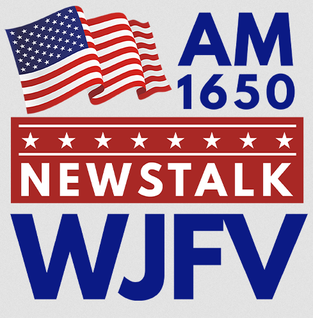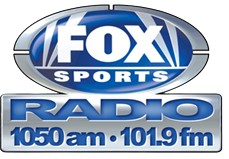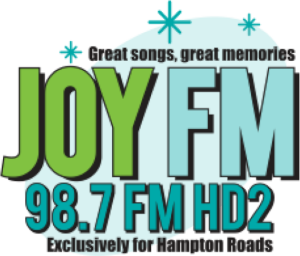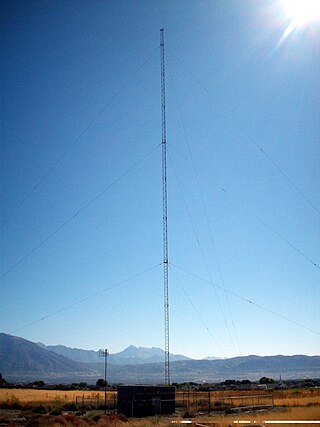Related Research Articles
WLRO (1210 AM was a radio station serving the Baton Rouge area of the U.S. state of Louisiana. The station broadcast with powers of 10 kilowatts daytime and 1 kilowatt at night, and was licensed to Denham Springs, where the transmitter was also located. Its studios were located east of downtown Baton Rouge near the I-10/I-12 interchange.

WPNI was an American radio station licensed by the Federal Communications Commission (FCC) to serve the community of Amherst, Massachusetts.
WDCD was a news/talk radio station licensed to Albany, New York, United States and served New York's Capital District, Adirondacks, and much of western New England. The station was owned by DJRA Broadcasting, and broadcast on 1540 kHz at 50 kilowatts from a three-tower directional antenna array adjacent to the station's studios in Colonie, New York.

WJFV is a commercial radio station licensed to Portsmouth, Virginia, and serving Hampton Roads. It broadcasts a conservative talk radio format and is owned by the Chesapeake–Portsmouth Broadcasting Corporation. The radio studios are on Brightwood Avenue in Richmond.
WKGE was a radio station licensed to Johnstown, Pennsylvania, and broadcasting with 10 kW day and night. Its final owner was Edward A. Schober through licensee Zip2, LLC. The station operated for 99 years, from 1925 to 2024, in its last two decades spending much of its existence simulcasting other stations. WKGE used a complex directional antenna to protect other stations on 850 kHz, a factor in the station's closure.

WDCR was a college radio station that operated at Dartmouth College for over fifty years. During this time, it underwent several format changes, from news to Top-40 to alternative music and in the end, oldies. Licensed to Hanover, New Hampshire, United States, the station served Hanover and the greater Upper Valley area. The station carried broadcasts of several Dartmouth College sports teams in association with the Dartmouth Sports Network, a division of Dartmouth Broadcasting. The station's license was held by the Board of Trustees of Dartmouth College.

WAYS is a sports radio station in Myrtle Beach, South Carolina. It is owned by Cumulus Media. Its studios are located on U.S. Highway 17 in Murrells Inlet, South Carolina, and its transmitter is located in the station's city of license, Conway, South Carolina.
WMTE was a radio station broadcasting a news/talk format. Licensed to Manistee, Michigan, it first began broadcasting on June 7, 1951 from facilities located on "Radio Hill" on the southern city limits of Manistee near the intersection of 10th and Olga Streets. The station surrendered its license on August 15, 2017.
WXMY was a broadcast radio station licensed to Saltville, Virginia, serving Saltville and Marion. WXMY was owned and operated by Continental Media Group, LLC.
KIIS was a commercial radio station licensed to Thousand Oaks, California, United States. It operated from 1971 to 2004. At the time of its sign-off, KIIS was owned by Salem Media Group and broadcast a top 40 music format as a simulcast of KIIS-FM in Los Angeles.

WGPC was a radio station serving Albany, Georgia, United States and surrounding cities with sports radio programming from CBS Sports Radio. This station broadcast on AM frequency 1450 kHz and was under ownership of Cumulus Media.
WHKT was a radio station licensed to Portsmouth, Virginia, serving Hampton Roads. The station was owned by Chesapeake-Portsmouth Broadcasting Corporation.

WJYI was a soft oldies and adult standards formatted radio station. It was licensed to Norfolk, Virginia and served the Hampton Roads region of Virginia. WJYI was owned by Saga Communications, Inc. and operated under their Tidewater Communications, LLC licensee. It featured programming from "America's Best Music" syndicated by Westwood One.
WBVA was a commercial radio station licensed to serve Bayside, Virginia, at 1450 AM, and serviced parts of the Hampton Roads region. The station broadcast from 1998 to 2018, ceasing operations when owner Birach Broadcasting Corporation voluntarily turned their license back to the Federal Communications Commission (FCC) for cancellation. The license surrender had followed an investigation by the commission into a decade of limited operations for it and co-owned WVAB.

KCOD was a radio station licensed to Palm Springs, California, United States. It served the Coachella Valley area. The station was last owned by College of the Desert. Programming was also simulcast on translator station K260DE in Palm Desert.
WPAY was an American radio station licensed to serve the community of Portsmouth, Ohio. The station was last owned by Douglas L. Braden and the final broadcast license was held by Radio Stations WPAY/WPFB, Inc. Established in 1925 in Bellefontaine, Ohio, the station ultimately moved to Portsmouth in 1935. WPAY fell silent in June 2011 following the divestiture of sister station WPAY-FM and its license was revoked in June 2012.

KLLB was a Christian/Gospel formatted radio station licensed to West Jordan, Utah. The station served the Salt Lake City area. The station was owned by United Security Financial, Inc.

KXLQ is a radio station licensed to serve Indianola, Iowa. The station is owned by Birach Broadcasting. The station had been silent; however, it returned to the air on April 21, 2010. As of January 18, 2013, it was carrying a sports format, featuring programming from SB Nation Radio and ESPN Radio.

WAIK was a radio station licensed to Galesburg, Illinois, with studios in Monmouth, Illinois. It went silent in January 2019 and its license was cancelled in June 2019. At the time it closed, it was operating a full service format with oldies.
Special Temporary Authority (STA) 74 CFR 73.1635 in U.S. broadcast law is a type of broadcast license which temporarily allows a broadcast station to operate outside of its normal technical or legal parameters. In the Federal Communications Commission (FCC) station database (CDBS), broadcast STA applications have a prefix of BSTA (general), BLSTA (legal), BESTA (engineering), or BLESTA (both). STAs can also be issued for other telecommunication services under FCC regulation. Often an STA is necessary due to an unforeseen event. A station operator must exhibit why the STA is necessary and serves the public good.
References
- 1 2 Trent, John C. "Re: Surrender of Radio Station License WVAB (AM) Virginia Beach, VA (Fac Id. 57611)". CDBS Public Access. Federal Communications Commission . Retrieved September 10, 2018.
- ↑ FCC History Cards for DWVAB
- ↑ "WVAB Facility Record". Federal Communications Commission, audio division.
- ↑ WTKR NewsChannel 3: News, Weather and Traffic in Hampton Roads and North Carolina | Two AM Radio Stations Now Silent In Virginia Beach [ permanent dead link ]
- ↑ WVAB-AM and sister Beach station off air after tower felled
- ↑ "Archived copy". Archived from the original on June 8, 2011. Retrieved March 19, 2008.
{{cite web}}: CS1 maint: archived copy as title (link) - ↑ WVAB-AM and sister Beach station off air after tower felled | HamptonRoads.com | PilotOnline.com
- ↑ WAVY TV 10 : Virginia and North Carolina News -Vandals may have targeted radio tower in Va. Beach [ permanent dead link ]
- ↑ "Hearing Designation Order" (PDF). Federal Communications Commission.
- ↑ "FCC's Silent Station Crackdown Targets Virginia AMs". Insideradio.com.
- 1 2 "WVAB Facility Data". FCCData.
- ↑ "Re: Donation of Radio Stations". FCC CDBS. Archived from the original on September 12, 2018.
- ↑ "License Cancelled". Federal Communications Commission Licensing and Management System. September 10, 2018. Retrieved November 24, 2024.